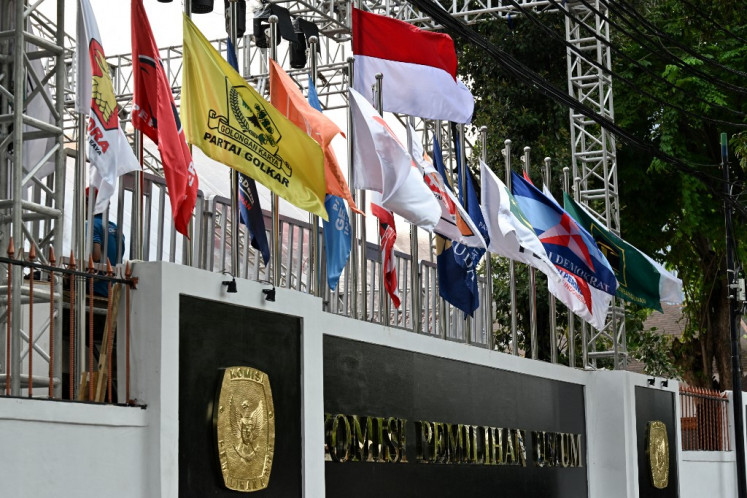Popular Reads
Top Results
Can't find what you're looking for?
View all search resultsPopular Reads
Top Results
Can't find what you're looking for?
View all search resultsInflation under control
Small money: People offer Rp 2,000 (14 US cents) bills in Kota Tua, West Jakarta, on Sunday
Change text size
Gift Premium Articles
to Anyone
S
mall money: People offer Rp 2,000 (14 US cents) bills in Kota Tua, West Jakarta, on Sunday. Bank Indonesia has reportedly set aside small denominations of rupiah in large numbers to meet the increasing demand from Muslims during the upcoming Idul Fitri. (JP/P.J. Leo)
The majority of Muslims who are fasting during Ramadhan can indulge in the consumption of spicy food, given that the price of chilli fell at the start of the holy month, when demand for spices is expected to be high, contributing to a relatively low inflation rate in May.
Together with rice, garlic and cayenne pepper, red chilli saw its price deflate over the past month.
The price of red chili, traditionally one of the main drivers of inflation as a result of its primary role as a condiment in many Indonesian dishes, actually decreased in May.
The commodity is available at Rp 34,700 (US$2.4) per kilogram on average across all provinces as of Monday, significantly lower than Rp 39,158 at the start of May, according to price monitoring website hargapangan.id, which is run by the government and Bank Indonesia (BI).
On Monday, the Central Statistics Agency (BPS) announced that the consumer price index rose 0.21 percent last month, bringing year-to-date (ytd) inflation to 1.3 percent. Year-on-year (yoy) inflation, meanwhile, was recorded at 3.23 percent.
The latest annual inflation figure is well within the government’s target range of 2.5 percent to 4.5 percent for this year, as outlined in the 2018 state budget.
A look at the components reveals that core inflation was 0.21 percent in May, while volatile food inflation was recorded at 0.19 percent over the same month. Inflation from administered prices, meanwhile, was recorded at 0.27 percent in May, with increases being recorded in the price of clove cigarettes and airfares.
“Volatility in food prices in May was under control thanks to the government’s efforts to manage food distribution and market operations in many places,” said BPS head Suhariyanto in Jakarta on Monday.
Inflation from foodstuffs was recorded at 0.21 percent, with several commodities, such as chicken, eggs, fish and shallots seeing price increases in May.
Suhariyanto called on the government to secure the supply of chicken and eggs, which traditionally see significant increases in prices in the period leading up to the Idul Fitri festivities, as demand for the commodities soars.
“Chicken and eggs usually contribute [to inflation] in the Idul Fitri season. This needs to be anticipated, because demand will go up until the Idul Fitri holiday,” he said.
In addition, the BPS also asked the government to keep an eye on inflation in the transportation sector, which usually contributes to headline inflation amid increasing demand from Muslims traveling back to their hometowns for the Idul Fitri holiday.
Finance Minister Sri Mulyani Indrawati responded positively to the latest inflation data, saying the figure for May was lower than for the previous period even though it coincides with the beginning of Ramadhan.
BPS data show that May’s monthly inflation of 0.21 percent and year-on-year inflation of 3.23 percent were lower than the equivalent figures in 2016 and 2017.
Sri Mulyani said the government would continue to work with BI to keep inflation in the central bank’s target range as well as to maintain people’s purchasing power.
“We will work together with BI to maintain the people’s purchasing power, so that it will not be eroded by price increases […]. The stability of food prices and supplies is also providing a good degree of certainty [to the public],” she said.
Trade Minister Enggartiasto Lukita said the government would continue its work to control the prices of key commodities, saying price declines could already be detected in commodities such as chicken, eggs and rice.
Center of Reform on Economics (CORE) Indonesia executive director Mohammad Faisal said the May figures reflected controlled inflation at the start of Ramadhan and was lower than last year’s figure of 0.39 percent.
Bank Central Asia’s (BCA) economic, banking and industry research team said the inflation outlook beyond Idul Fitri was affected by two external factors: the strong United States dollar performance against global currencies — including the rupiah — as well as the increase in global oil prices.
“So far, the depreciation of the rupiah against the US dollar has caused a noticeable uptick in wholesale prices, although still far below the levels seen during the 2013 and 2015 depreciations,” the team wrote in a research note on Monday.
Meanwhile, the impact of rising global oil prices was relatively subdued, thanks to the government’s commitment to maintain energy prices, the team said.
As the effects of these external shocks were likely to be limited, the team projected, inflation would reach 4 percent this year.
Maybank Indonesia economist Myrdal Gunarto said the relatively modest inflation rate in the period leading up to Idul Fitri was largely due to the government’s efforts to rein in volatile food prices in a bid to maintain domestic price stability, which could increase people’s purchasing power.










